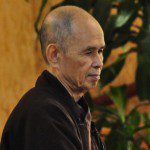Bernie Sanders appeals to white Progressives. That much is obvious.
But not all Progressives are lining up behind him. Notably, those fighting for racial justice under the #BlackLivesMatter banner have targeted him and he finds himself far behind Clinton and even trailing yet-to-be-running Biden in South Carolina, where 55 percent of the voters are black.
In a recent column in the New York Times, Charles M. Blow explores Sanders’ lack of appeal with black voters. There he writes that “An August Gallup Poll found that Hillary Clinton’s favorability among African-Americans was 80 percent, while Sanders’s was 23 percent.” And even more disturbing, “Two-thirds of blacks were unfamiliar with Sanders.”
Disturbing as that might be, it’s both understandable and correctable.
As I drove two weeks ago from my home in Helena, MT to Missoula where I teach, I listened to an NPR story about the potential candidacy of Joe Biden. There, Rachel Martin and Mara Liasson discuss the “antiestablishment fever that’s been sweeping the Democratic Party base” while failing to mention the person at the vanguard of that fever. Liasson even, quite gallingly, says of a potential Biden candidacy that, “There are many Democrats who think it would be good for Hillary Clinton because she’d have a serious opponent, and it would help her become a better candidate.”
Really, no serious opponent? But my jaw didn’t really drop until I heard her next line: “Right now, she’s basically running against herself and her problems.”
If NPR, a supposed bastion of left-leaning thought, can have a nearly 5-minute discussion of the Democratic presidential race without so much as mentioning Sanders, we have a problem.
While NPR here simply ignored Sanders, other media stories have merely noted his name or ridiculed him as an impossible outsider, a socialist, and as appealing only to his own existing fan-base (which is, if we can judge by crowds at his speeches, rather huge).
In order to counter this apparent laziness by the media, Sanders is going to need to go directly to the people he wants to reach and prove to them that he understands their problems and can help as President. I watched his talk this week at Liberty University as an outstanding example of his failure to do just that. From the outset he is perfectly honest about who he is and where he likely differs from the students of Liberty U, but he moves on too quickly to what he believes to be a powerful common interest: the injustice of the extraordinary inequality in our country. I have no doubt that Christian conservatives dislike extreme inequality, but in general they just don’t think it’s the government’s responsibility to remedy that, and nothing in Sanders’s speech is likely to convince them otherwise.
Writers at Religion Dispatches posted two responses to the speech. In one, Sarah Posner lauds Sanders for breaking out of the Democratic “faith outreach” mold. Her analysis is spot on and it shows his ability – or at least willingness to try – to find common ground with people who might be tempted to ignore or oppose him. Daniel Schultz gives Sanders a B- (or Solid C, according to the URL) for religious outreach, wishing that Sanders had done more digging through scripture in making his case for economic equality.
I agree. Bernie made connections with the students, but only ever so briefly, and only to then move on to his central message of economic inequality. His fans there, and perhaps some of the Liberty U students, cheered loudly at times, but he probably didn’t connect with anyone that didn’t already generally agree with his progressive politics.
Returning to the topic of the black vote, “Polls show that black people line up with Bernie on the issues,” writes Jennifer Epps-Addison in her insightful discussion of the tension between white progressives and the #BlackLivesMatter movement. She continues, referring to hostile and dismissive reactions from white people after the interruption of a Sanders speech by activists, “But when progressives react to the #BlackLivesMatter movement with racism and hostility, it weakens our movement and makes it a lot harder for black folks to #FeelTheBern.”
Sanders needs to take the same approach that he brought to Liberty U to a speech given to black Americans, given with the same humility and forethought about the differences he and they might have. But he needs to go deeper, to actually talk about the central concerns of black Americans, to show that he cares about them as something more than numbers and statistics who will benefit from his grand economic ideas.
As we read in Ned Resnikoff’s July story for Al Jazeera America:
Former Ohio state Sen. Nina Turner said progressives need a separate political program for dealing with racial disparity. “Progressives need to come together and address this issue head on, not wrap it in everybody else’s stuff but say separately that black lives matter and we’re going to push policies and do something about it,” said Turner, who is black.
That would entail rejecting the midcentury social democratic vision of a unified people’s platform to build a new, distinctly American social democratic vision that is more firmly rooted in the social and political history of the United States.
Sanders and O’Malley should have gotten off the stage during the Black Lives Matter protest and joined the activists where they stood, Turner said. “They should have come down to where they were and had a real conversation.”
What does Buddhism have to do with any of this?
That is a good question, but one that I think will become ever more irrelevant as the political campaign progresses. Some scholars and practitioners of Buddhism will quickly tell you that Buddhism has no political philosophy of its own, or that Buddhism -like other religions- ought to stay out of politics and political conversations.
The first is perhaps generally true; Buddhism might not have a political philosophy in the sense that we’d like to appeal to today such as that of Plato or Kant, though Buddhists throughout history have developed and endorsed certain political ideals. The Buddha himself interacted regularly with kings (or heads of confederacies) and likely designed his community of monks and nuns around the consensus-oriented Shakyan confederacy in which he was raised. The Buddha was notably successful at speaking directly to the needs of particular listeners as individuals and as communities. In this way Buddhism has never not been in politics.
The second concern conflates Buddhism in politics with authoritarian states that happen to be predominantly Buddhist. And just as Muslims should be concerned and active in American politics without people suggesting that they (American Muslim activists) are trying to make us like Iran, Buddhists should be concerned and active in American politics without concern that they’re dragging our society toward 1930s Japan or a Burma-like pariah state.
And Sanders even name-drops Buddhism in his Liberty U speech, saying: “I am far, far from a perfect human being, but I am motivated by a vision which exists in all of the great religions — in Christianity, in Judaism, in Islam, Buddhism and other religions — and which is so beautifully and clearly stated in Matthew 7:12,” referring to the Golden Rule.
Buddhism has been a force in global politics, and even as a tiny minority in America it will certainly play a role in politics here.
In the months to come I hope to write more about aspects of Buddhist philosophy that can and clearly do apply to political thought in the world today. I’m sure much of what I write will be debatable and I hope most of all to learn through the process to be a more informed voter myself. When I began this article it was written purely as a praise of Sanders for what I saw as an inspiring and humble speech at Liberty U and for an economic policy platform that would make the lives of America’s poorest people (who are disproportionately black and Latino) much, much better. But in reading and thinking about the articles I cite, specifically the ones by Daniel Schultz and Ned Resnikoff, I saw a common, previously unconnected thread describing why Sanders is not energizing many people outside his existing base. There was at least one Evangelical won over by Sanders who has been in the news of late, but he seems to be a notable minority.












